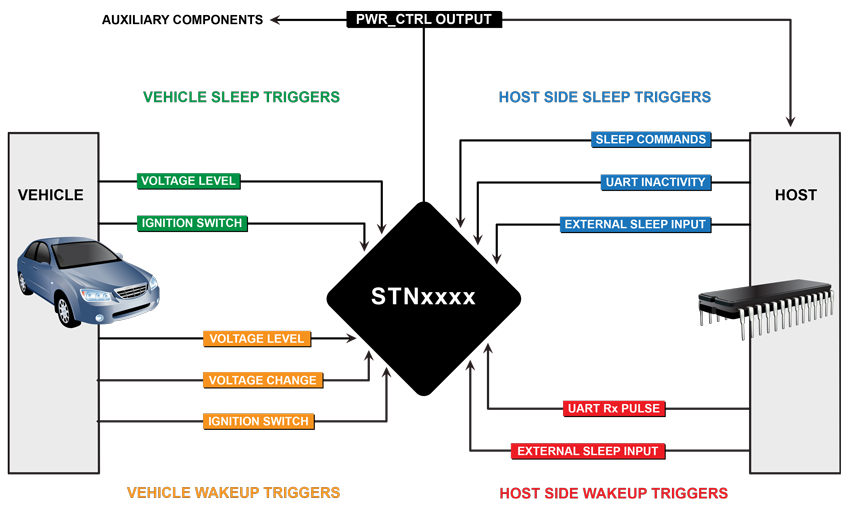
STN2120 OBD-II, SW-CAN, MS-CAN to UART Interpreter IC
Part No.: MPST-STN2120-OBD-II-SW-CAN-MS-CAN-to-UART-Interpreter-IC
STN2120 offers twice as much flash and four times as much RAM, while keeping the same low cost as STN1170.
產品介紹
STN2120 OBD-II, SW-CAN, MS-CAN to UART Interpreter IC
STN2120 offers the same features and functionality as STN1170 with even higher performance. STN2120 offers twice as much flash and four times as much RAM, while keeping the same low cost as STN1170.
Detail
STN2120 is a 44-pin OBD to UART interpreter IC that provides bi-directional, half-duplex communication with all vehicle OBD-II legislated protocols, plus support for SW-CAN (GM) & MS-CAN (Ford). STN2120 is available at the same price as STN1170, yet has twice as much flash and four times as much RAM, allowing for more features to be included with future firmware updates and higher performance.
SW-CAN protocol support allows your device to access, monitor and issue commands on vehicles utilizing GM’s proprietary CAN network. Similarly, MS-CAN provides access to Ford’s proprietary CAN network on supporting models.
On vehicles hosting SW-CAN or MS-CAN networks, our enhanced ST command set allows your device to interpret data not available on the vehicle’s OBD-II bus. Using the GM & Ford proprietary codes, you can commonly interpret current status of systems such as:
- Seat belt
- Airbag
- Headlight
- Anti-Lock Brake (ABS)
- Traction Control
Control commands commonly found on supported vehicles include:
- Door lock/unlock
- Window up/down
- Radio volume up/down
- Turn signals & Hazard on/off
- Engine start/kill
While STN2120 ST commands will provide access to SW-CAN and MS-CAN networks, the proprietary GM & Ford codes must be obtained independently. A popular method is to join the Equipment and Tool Institute where the codes can be accessed/purchased. Alternately, the traffic can be analyzed and reverse engineered.
Key Features
- Configurable GPIO pins.
- Safe, secure bootloader. Reflash the firmware in the field, even over a poor quality link and avoid expensive product recalls.
- Fully compatible with ELM327 command set, ensuring out-of-the-box compatibility with the dozens of existing software applications.
- Extended “ST” command set provides access to enhanced functionality, without compromising compatibility.
- PowerSave mode with multiple sleep and wakeup triggers. Ideal for permanent in-vehicle setups, device can be left connected for extended periods of time without draining the battery.
- Perfect form factor for any application. STN2120 is available in the QFN44 package.
- RoHS compliant
Stability
- Solid, field-tested software. STN2120 runs the same proven code that powers the popular STN1110 and OBDLink family of PC-based OBD interfaces. Thanks to its large user base, any problems are discovered and corrected quickly.
- Large OBD message buffer. STN2120 has over five times as much RAM as its nearest competitor, virtually eliminating BUFFER OVERFLOW errors.
- Automatic protocol detection algorithm is continuously fine-tuned to insure that STN2120 will connect to the widest array of vehicles, even those that do not fully conform to the OBD-II standard.
Powersave Sleep & Wakeup Triggers
The diagram shows the various triggers available in the STNxxxx family of ICs.

Specifications
| Device Weight | 0.0064 oz (0.18 g) | |
|---|---|---|
| Dimensions | 8.04 x 8.04 x 0.87 mm | |
| Operating Voltage | 3 - 3.6V DC | |
| Operating Current | 63 mA | |
| Battery SaverTM Mode | < 2 mA | |
| Operating Temperature | -4º to 185ºF (-40º to 85ºC) | |
Protocols
-
All legislated OBD-II protocols
- ISO 15765-4 (CAN 250/500 kbps, 11/29 bit)
- ISO 14230-4 (Keyword Protocol 2000)
- ISO 9141-2 (Asian, European, Chrysler)
- SAE J1850 VPW (GM)
- SAE J1850 PWM (Ford)
-
Non-legislated OBD-II protocols
- SAE J2411 Single-Wire CAN (SW-CAN) – GM proprietary network
- Medium-Speed CAN (MS-CAN) – Ford proprietary network
- ISO 15765
- ISO 11898 (raw CAN)
- SAE J1939 OBD protocol used in heavy-duty vehicles